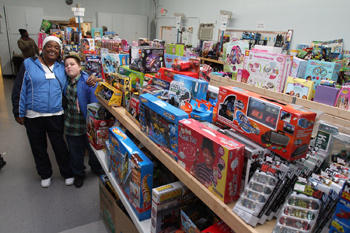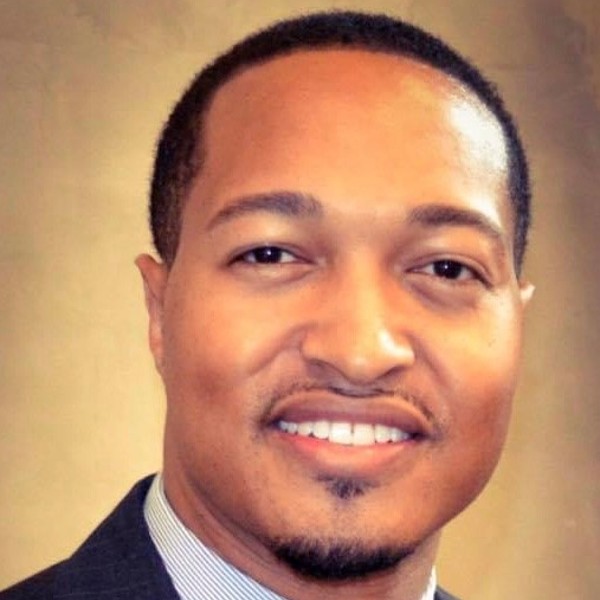LaTonya Rucker, a 36-year-old disabled mother of five, felt her heart sink when she approached Sixty-First Avenue United Methodist Church at 5:30 a.m.
There were already so many people in line that she feared she was too late.
It was the Sunday before Christmas, and those in the queue outside the small white building in west Nashville were waiting for a golden ticket of sorts: A numbered slip of paper allowing them to select new, free gifts at the church’s Last Minute Toy Store. But it turned out she was No. 375, the last to be admitted for the day.
“What are the odds?” she said. “Next time I’ll know.”
What Rucker wasn’t aware of is that the first in line -- another mother of five who told her children she was going to the North Pole for a couple of days -- had been there since Friday night.
For 18 years, the Sixty-First Avenue United Methodist Church has operated the Last Minute Toy Store in the final days before Christmas. It is an event that is all about giving; during the four days the store was open last year, more than 4,600 children and youth from more than 1,400 families received new toys and gifts, along with books, oranges and candy canes, at no cost.
But this is not an affluent church that just opens its pocketbook. The humble congregation, all but a few low-income themselves, offer their ongoing time, efforts and sense of ownership instead. The toy store -- with more than 20,000 gifts worth some $200,000 donated by individuals and organizations citywide in the months preceding Christmas -- is aimed at reaching those who have missed the deadline for toys from other agencies.
It also draws hundreds of individual volunteers who join members of the congregation in pulling it off. Many volunteers receive assistance themselves.
Each year, the church -- located in an area where 90 percent of the children qualify for free or reduced-price lunches -- experiences the spotlight during the December event. But the Last Minute Toy Store is simply the largest and most public example of the way the congregation embodies its mission to serve the community.
It squarely points to a core belief of not only the pastor but also the congregation: the importance of ministry with the poor instead of for the poor.
“It’s not about caring about people from a distance,” the Rev. Paul Slentz said. “The thing that’s really important to me … is not (solely) the idea of providing things for people in need.
Questions to consider
Questions to consider:
- There is something profoundly incarnational about ministry with rather than to people in need. How are your ministries similarly incarnational?
- When have you participated in a community of mutual caring? What made it so?
- How important is it that those who are serving through the Toy Store are poor themselves? What might this say about understanding the context of one’s ministry?
-
What mindsets have been created in the congregation of Sixty-First Avenue UMC through the activities associated with the Toy Store? How might a mission program or project in your institution help cultivate more faithful mindsets in your institution?
“It’s helping grow a community of struggling folks into a community of mutual caring and being there for each other. It’s giving them an opportunity to serve and encourage others, and be disciples themselves.”
The ministry of toys
The toy giveaway began when the small church received a call from the U.S. Marine Corps Reserve Toys for Tots program about creating a distribution point in West Nashville. Toys for Tots still provides some of the items each year, said “chief elf” Doc Hooks, who coordinates the massive undertaking.
But as time has passed and the event’s reputation has spread, the giveaway has become a signature of this congregation, and donations have come from an increasing number of sources, including drives at schools and companies.
“There are lots of really nice people looking for a place to have an impact,” Hooks said. “And this is a place that’s perfect for it.”
In the weeks leading up to the toy store, the donated gifts are held in a storage building, with added space in a semi trailer-truck parked nearby. Many companies give year after year without prodding, but church staff seeks out shopping assistance and discounts when donations come in cash.
Slentz oversees it all, starting with the planning each August, running steering committee meetings and taking care of the financials. Hooks, who is a member of another congregation but had volunteered for many years and has headed up the event for the past half-dozen, orients volunteers and is in charge during the hours the store is open. They’ve learned to delegate to the many volunteers that show up.
(Ask anyone involved what it would take to begin such an event somewhere else, and the answer is consistent: Start small, perhaps with people you already know rather than an entire community, because things can quickly get out of hand.)
The congregation models dignity and respect for those less fortunate throughout the event. Those who receive gifts have the chance to choose items themselves rather than simply receiving generic, age-appropriate toys picked by someone else. And in the middle of the night, when recipients are lined up for the early-morning distribution of timed shopping tickets, volunteers offer them coats, warm drinks and sing carols.
“We want people to feel comfortable,” said Brenda Hix, a lay leader and constant presence at the church. “This is a place where you can feel like you’re needed and wanted.”
Kelli Bratton, community programs manager at nearby St. Luke’s Community House, a social service agency that offers child care, mobile meals, parenting classes and other services, said she senses a great underlying compassion in how the toy store is run. The two organizations work together in many ways, including serving area seniors and sharing resources.
“But what is unique to them is the way they’ve been rooted in the community for so long,” Bratton said. “They have such an intimate connection with people. … I perceive them to be one of the most involved, active, mission-minded churches in the neighborhood.”
Caring for the poor every day of the year
On any given Saturday night, the congregation -- many of them middle-aged, quite a few formerly homeless -- mix easily with community members and volunteers. The church offers a free, hot meal before the service to anyone who comes. There is no “us” or “them” but rather a shared experience of being together.
In early December, about 60 people came for the meal and stayed for the Advent service. They stood in a loose circle in the warm sanctuary, praying aloud. A Christmas tree stood on the side wall, accents of maroon highlighting the room’s honey-colored wood.
They prayed for improved health and finances for those they knew, for various struggles of everyday life -- but not one asked for anything for him- or herself.
“People like to think the poor are all lazy, that they’re not trustworthy or that they’re ungrateful,” Brenda Hix said. “The poor are just like the rich in God’s eyes. We’re no different. He doesn’t care what’s on your body; he only cares what’s in your heart.”
Hix, a rosy-cheeked grandmother, grew up in the surrounding neighborhood -- and at the church. She stepped away for a while, but when Slentz took the helm and personally invited her to return, she couldn’t help but come home.
A retired quilter for a mattress company, she counts herself among the area’s poor -- but more than that, she sees herself as an instrument to be used by God.
“Most poor Christians I’ve known are in some kind of ministry,” Slentz said. “They understand that the things they do on a regular basis to care for others are done in the context of faith.”
The congregants may not have money to give, but they will offer whatever other resources they can. In addition to the free meals for the community, the church and its volunteers provide youth group activities, after-school and summer programs, emergency assistance, outreach to seniors and more.
Partner congregation Franklin First United Methodist Church comes alongside with varied support, “but it isn’t like a bunch of well-to-do people come in and run the poor church,” Hooks said. “It’s their church, and they run it. They have ownership.”
The Rev. Vona Wilson, associate pastor at Franklin First, agrees. She believes the church has truly developed a sense of trust and respect among its neighbors.
“We’ve been having regular community meetings there for the last few years,” she said. “People who don’t attend the church can experience what it’s like to come into the room and speak freely and respectfully, and everybody’s OK. We’re only there to help, not to do anything else. We’re not there to tell them to change their life in any way.
“People are experiencing love and grace, and that doesn’t just come in a sermon. … The grace of God is that your opinion is worth me listening to it.”
Giving out of ‘genuine kindness’
From the beginning, Slentz has seen the Last Minute Toy Store as an opportunity to open the church doors to the wider community. He graciously welcomes outside support year-round, especially when those who come to give are willing to stay and worship side by side with those they’ve served. In many ways, it levels the field.
He began considering how his own faith related to the larger world when he was a conscientious objector to the Vietnam War. And it was people like his father -- a Kansas City doctor who spent every Friday for 20 years at a clinic for the disadvantaged -- and an older sister -- a generous soul who died of breast cancer in 2005 -- who made him aware of how connected that world really is.
Slentz, still in his first appointment as a United Methodist pastor, has been at the church for nearly 15 years. Before that, he spent his days as a layperson working with the homeless, coming from a church tradition with a strong emphasis on “issues of justice and care for the least of these,” he said.
He was still in the process of earning his divinity degree when the opportunity at Sixty-First Avenue arose and jumped at the chance to join the then-fewer-than-10-member congregation and be in the midst of where God was at work.
In the early days, Slentz planned the Last Minute Toy Store and also handled the minute-to-minute details during the event itself. Then Hooks offered to let him do what he does best during those hours: maintain a pastoral presence for anyone in need.
“I remember, the very first time, I had no idea what to expect,” he said. “I had been told that I wouldn’t believe what it was like. But there was a line of people that went all the way down the block, and then around the block. There were just so many.”
Slentz was moved by the need, though at times he has been challenged by the event’s connection to the commercialism of Christmas. He has come to value it for the impact it has on those involved.
“What I see with the Last Minute Toy Store is people giving -- often just of their time, because they don’t have the resources to give money or toys -- out of a genuine kindness, and often with a very intentional desire to celebrate the birth of Christ through acts of caring for those who are struggling,” he said.
As for the receiving end, it’s a bit more “ambiguous.” On the one hand, he said, it relieves some stress for parents who want to give but are having trouble being able to.
“And that is a good thing, a caring thing. On the other hand, it is sad that the pressures of society are such that the inability to provide gifts is so stressful. Coming at this from the perspective of a parent, and not a pastor-theologian, I know that I have always wanted to provide gifts for my two boys, from the time they were old enough to know the difference. Even now -- at ages 30 and 24 -- we try to do at least something for them.
“And, slipping back to theology, gift giving is certainly one legitimate way to show love of others in response to God’s many gifts of love to us -- Christ being the greatest gift of all.”
This time of year, many visitors to Sixty-First Avenue United Methodist Church won’t be aware of the congregation’s neighborhood programs, its after-school and child-care services, or even its regular free meals.
Some, like single mother Clarissa Sebree, are simply overjoyed with the Dora the Explorer activity set she received for her young daughter. Or, like Patricia Ann Jackson, with the bike she picked up for one of her nine grandchildren.
But there’s much to be discovered behind the rows of donated brand-new toys. There’s an underlying gift of peace, acceptance and community.
It’s seen in the disabled woman who secures a ride once a week to come in and sort the clothes closet, or the congregant who helped a homeless friend bathe in the bathroom before an evening service.
“This is the one place you can leave everything at the door,” said Nita Haywood, Sixty-First Avenue’s director of children and youth ministries. The offering of the toy store serves as a great motivator for the congregation and offers a great sense of accomplishment, she said, “but we reach out to these children and their families and the homeless throughout the year. We’re here. ... We’re real.”




















